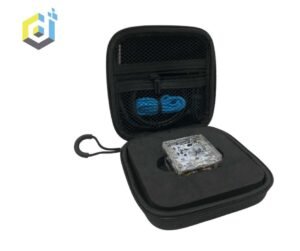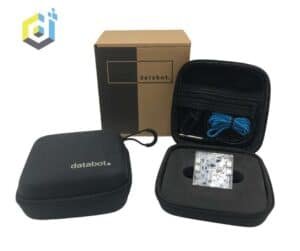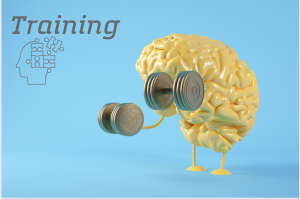Let My Phone Open the Door

I can confirm that girls’ fear of STEM is as a result of lack of knowledge and access to STEM tools. The world really needs girls to be part of solving problems.
— Abdul Razak Issah
Abdul-Razak Issah strikes me as a magical man and passionate educator as I watch him stride back and forth watching data on his cell phone and talking excitedly about gravity and acceleration. It’s all through Zoom. He’s in Ghana and I’m in the US so it’s a bit choppy, but I get the gist of what he is talking about. He’s excited to have a new STEM tool in his hands that he will be able to take to his students. This was my first meeting with Abdul to learn more about his non-profit organization, LING Project (Literacy in Northern Ghana), an organization working within hard-to-reach areas of Northern Ghana with a mission to bring positive change to the female population within these communities. I had just introduced Abdul to our Ninja Physics – Sensor Science Initiative (SSI) that provides students with the ability to explore science using the sensors built in to a smart device. Smart phones are loaded with sensors and can be used for introducing students to sensor based data collection easily and at minimal cost. Smart phones vary in terms of available sensors, but they will almost all have an accelerometer built in to them. The accelerometer is how your phone tells position and re-orients from portrait to landscape when you tip you phone. A great real-world example of sensor use for students right there!
Abdul’s enthusiasm was palpable. As he worked through Ninja Physics, an activity set that engages students to directly interact with accelerometer data, it was obvious he was excited to have one more tool available in his educational technology toolbox. Suddenly, with just a smart phone, students would be able to visualize forces of acceleration, acceleration due to gravity, and explore 3D cartesian coordinates through live interaction with the force of gravity on 3 axes of motion.
Equity, Access, & the Big Win
Lack of access to technology and learning tools is one of the great inequities in the world and underserved communities such as girls in Northern Ghana are on the wrong side of the inequity equation. I think Abdul’s excitement was in part due to the new possibilities offered by using ubiquitous technology like smart phones as a tool for exploring sensor data. Bringing the hidden world of data into the light of day for girls in Ghana can change the world. If we can make the data that surrounds us accessible, understandable, and concrete suddenly the doors to understanding will open. This is how we will solve the world’s challenges, by eliminating inequities, engaging students with active learning, and putting open access to scientific data into the hands of the next Einstein, Curie, or Tesla.
The image shown here is from the the Ninja Physics lesson series in which students use a smart phone accelerometer to visualize the force of gravity (9.8 m/sec2), explore their own acceleration (yes, you CAN move with zero acceleration if you are a trained Ninja), and challenge one another to master physical challenges based on interacting with live sensor data. Once students physically interact with abstract concepts like gravity the lights go on. I saw this excitement in Abdul’s eyes as he practiced Ninja moves and explored the Vizeey™ app.

Vizeey™ smart phone display of live acceleration on the Y axis.
Why is STEM Technology Important?

LING student in Northern Ghana exploring acceleration with Ninja Physics.
I recently asked Abdul why technology access was so important to his mission of increasing access for underserved communities and he responded.
“Being passionate about the future wellbeing of these vulnerable girls, it is compelling for us to redirect our focus to prepare future job prospects for filling the employment opportunities that are coming with the 4th Industrial Revolution (4iR). That is why we are adopting STEM to help create the proper mindset about these future jobs thus filling the gender disparity gap in these industries. The future depends on data science, robotics, drones etc. and we are working to make these technologies accessible and non-threatening.”
A recent post of Abdul’s on LinkedIn drove the importance of access home even further for me.
I can confirm that girls' fear of STEM is as a result of lack of knowledge and access to STEM tools. The world really needs girls to be part of solving problems.
Abdul-Rasak Issah
Abdul’s commitment to making this happen is remarkable and he has collaborated with organizations and companies around the world. For example, STEMPunks, an Australian STEM education company has donated drones and other materials and support to assist Abdul with his reach into these underserved communities. Drones in particular hold a fascination for students as they learn the basics of flying and exploring this advanced technology. These engaging, marvelous experiences that Abdul is bringing to these students are building life skills that will help them be comfortable in the 4iR workplace. If we can eliminate the fear and anxiety of the unknown that is connected to high technology through regular exposure and awareness, it is a huge step towards closing the gap between the served and the underserved.

Ghana students exploring the force of gravity on the smart phone Z axis.

Students practicing with drone technology (above) and exploring the force of gravity using a smartphone accelerometer (right). These Girls in Ghana are experiencing STEM technology first hand and preparing for jobs of the future thanks to the LING Project.


The Australian STEM company STEMPunks also contributed Smart Garden devices to LING which empowered female students to monitor growing conditions, humidity, light, soil moisture, and temperature, to determine optimal growing conditions for agriculture. Their data-based findings were applied to local farm projects and ultimately improved agricultural processes and practice to improve crop yield. Real STEM improving lives.
The Great Equalizer - Bridging the STEM Technology Gap to Improve Equity

databot™ is an amazing, tiny, multi-sensor device designed to facilitate exploring data in engaging, exciting new ways that captivate students’ interest and guide them into a natural conversation with the scientific data that surrounds them. databot™ is an educational technology “equalizer” as now a classroom can have fast and easy access to sensor data. Previously, outfitting a classroom with this much sensor capability was beyond the reach of underserved communities and only possible using expensive and intimidating probeware.
Vizeey™ is a free smart app that will connect wirelessly to the 15 sensors onboard databot™ in addition to accessing and displaying the data from any internal sensors it finds on board the smart phone. Nearly all devices will have an accelerometer.
Team databot™ created the Sensor Science Initiative (SSI) starting with Ninja Physics to help extend the reach of these types of activities into underserved communities. No fees or costs are associated with joining the initiative, participants simply need access to smart devices, excited students, and the commitment to execute the program.
As student exposure to STEM technology increases, so does their comfort level with technology. As Abdul said, “The future depends on data science, drones, robotics, etc.” In order for us to properly prepare students everywhere for the jobs of today and the future, we need to get technology into their hands so it becomes natural to use. If we want to achieve equity and enable all the future brilliant scientists that are out there somewhere in the world, we need to put forth the effort to reach everyone. As the quotation goes, “be the change you wish to see in the world.” Abdul-Razak Issah is doing it, and, as a result underserved communities of girls in Ghana are getting prepared for a very bright future.
About databot™
databot™ learning solutions transform the way K12 students experience data, science, and technology. In the classroom, after-school, and in the home, our mission is to make interacting with and understanding data a beautiful, fun, and ubiquitous experience. One that crosses the traditional boundaries of all learning environments. The world is driven by data and we are driven to teach future generations how to use it for good. We create data powered technology and brilliant learning activities that empower students everywhere to think deeply, explore with passion, and solve our planetary scale challenges.
Contact us to share ideas, comments, and learn more about our products and mission.

databot Rocks! Get Yours Today!
-
databot
databot – Twin Pack
$375.00 Select options This product has multiple variants. The options may be chosen on the product pageRated 0 out of 5 -
databot
databot – Class Pack
$1,850.00 Select options This product has multiple variants. The options may be chosen on the product pageRated 0 out of 5 -
databot
databot Training Modules
$399.00 – $1,000.00 Select options This product has multiple variants. The options may be chosen on the product pageRated 0 out of 5




